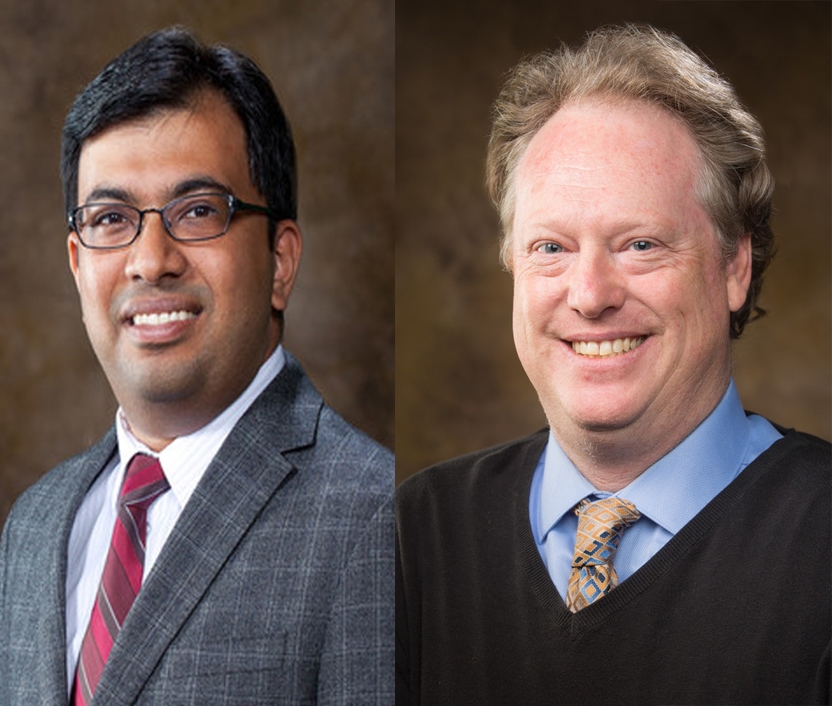FAYETTEVILLE, Ark. – Two biomedical engineering professors at the University of Arkansas have been awarded $375,000 from the National Science Foundation to study how repeated injuries over time impact the human brain.
Associate professors Kartik Balachandran and Jeffrey Wolchok in the College of Engineering received the grant as part of a three-year project to investigate what happens to the brain when it receives multiple non-severe injuries, such as concussions.
It’s a research area with wide implications, but one that has received little attention from the research community.
“There’s been a lot of importance given to studying severe traumatic brain injuries, but this is an understudied aspect,” Balachandran said. “These injuries may be below the threshold of ‘severe,’ but with repeated injury, that damage can accumulate.
“Everyone has someone they know who has been affected by this kind of injury,” he said. “Whether it’s from the sports field or the battlefield, traumatic brain injuries are a major problem.”
The project focuses on building a “brain on a chip,” a device based on the design of a computer chip, that simulates the blood-brain-barrier, the area between the blood vessels in the brain and the brain itself.
Researchers need to understand what happens to the blood-brain-barrier after an injury to facilitate the development of drugs that can successfully make their way into the brain to treat the injury.
“It’s a miniature version of a blood-brain-barrier that we can impact over and over again and study the results,” Balachandran said. “If we can understand the blood-brain-barrier impairment, it will benefit anybody who’s had a brain injury or concussion.”
Beyond injuries from sports or battle, Balachandran said, the elderly are prone to the type of non-severe brain injuries that would be affected by this research.
“In the aging population we’re seeing more traumatic brain injuries as falls result in head injuries,” Balachandran said. “If we can understand biologically what happens after one and many injuries, we can develop a therapeutic strategy to treat them.”
Developing a chip that can accurately imitate the blood-brain-barrier would make the drug testing process much more efficient, Balachandran said.
When pharmaceutical companies need to test the effects of a drug, they often begin at the cellular level, then move up to mice and other animals before eventually testing a refined version of the drug in the human body. The “brain on a chip” would allow researchers to skip many of those steps and study results at a human level immediately.
Funding from the grant will also help support a summer camp to encourage high school students to learn more about biomedical engineering.
“The recruiting of scientists and engineers has always been a challenge for colleges and universities,” Wolchock said. “The camp is intended to create a spark of interest in engineering that we hope will motivate students to pursue higher education.”
The camp is entering its fifth year this summer.
“Receipt of this award by Drs. Balachandran and Wolchok is a testament to not only their collaborative research efforts focused on traumatic brain injury, but also their commitment in ensuring the next generation of scientists and engineers are made aware of contemporary biomedical engineering solutions for understanding and treating an important health issue,” said Raj Rao, professor and department head of biomedical engineering.
About the College of Engineering: The University of Arkansas College of Engineering is the largest engineering program in the state of Arkansas. The College of Engineering offers graduate and undergraduate degrees in nine engineering fields, as well as incorporating distance learning and interdisciplinary programs.
About the University of Arkansas: The University of Arkansas provides an internationally competitive education for undergraduate and graduate students in more than 200 academic programs. The university contributes new knowledge, economic development, basic and applied research, and creative activity while also providing service to academic and professional disciplines. The Carnegie Foundation classifies the University of Arkansas among only 2 percent of universities in America that have the highest level of research activity. U.S. News & World Report ranks the University of Arkansas among its top American public research universities. Founded in 1871, the University of Arkansas comprises 10 colleges and schools and maintains a low student-to-faculty ratio that promotes personal attention and close mentoring.
Topics
Contacts
Kartik Balachandran, Associate Professor of Biomedical Engineering
College of Engineering
479-575-3376, kbalacha@uark.edu
Jeffrey Wolchok, Associate Professor of Biomedical Engineering
College of Engineering
479-575-2850, jwolchok@uark.edu
Nick DeMoss, director of communications
College of Engineering
479-575-5697,
ndemoss@uark.edu
